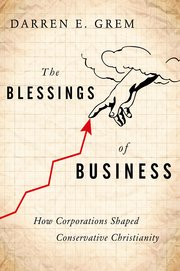Three members of the Arch Dalrymple III Department of History have been selected by Chancellor Jeffrey Vitter to serve on the Chancellor’s Advisory Committee on History and Context (CACHC), which is charged with recommending campus sites, including monuments, buildings, and street names, that should be contextualized to better explain the environments in which they were created or named and how those environments compare to our core institutional values. Charles Ross, Professor of History and Director of African American Studies, John Neff, Associate Professor of History and Director of the Center for Civil War Research, and Anne Twitty, Associate Professor of History, will serve alongside eleven other members of the CACHC. The committee will engage in a transparent and inclusive process that aligns with the UM Creed and employ a variety of methods to ensure broad community input, including the addition of ad hoc expertise as needed on a project-by-project basis, and will keep the community informed of the status of projects under consideration.
Archive for the ‘News and Events’ Category
UM Professor Awarded Prestigious Princeton Fellowship
Assistant Professor of History and African American Studies Shennette Garrett-Scott has been awarded a Shelby Cullom Davis Center for Historical Studies fellowship to Princeton University for the 2016-2018 academic years.
Shennette Garrett-Scott is among only a half-dozen scholars from around the world to receive the Princeton fellowship this year. The theme of this year’s Davis fellowship is “Risk and Fortune.”
Garrett-Scott’s scholarship focuses on gender, race and business, all topics that coincide with a book she’s writing on African-American women in finance and banking.
“The center’s biennial theme ‘Risk and Fortune’ was precisely up my alley,” Garrett-Scott said. “People have tried to avoid risk and increase their fortunes throughout history. They insure their lives against inevitable misfortunes that acknowledge – and hopefully limit – risk. They save and invest money to increase their fortunes.”
Her book explores the Independent Order of St. Luke, a mutual aid society organized in Baltimore in the 1850s by African-American women. After moving to Richmond, Virginia, following the Civil War, the IOSL organized a bank that became the oldest operating African-American-controlled bank until it was purchased in 2011.
“My book is the first history of the insurance and banking industries that focuses on African-American women, tracing how they saved, lent and invested from the Jim Crow to the civil rights era,” she said.
The fellowship will allow her to continue her research while contributing her own knowledge to the intellectual culture at Princeton. The fellows will participate in weekly seminars, conferences, workshops and other activities to bring together scholars from different disciplines to study historically important topics.
“This fellowship will allow her to finish researching this very innovative topic and allow her the opportunity to dialogue with other fellows and faculty at Princeton,” said Charles Ross, UM director of African-American studies and professor of history. “This is a wonderful opportunity for Dr. Garrett-Scott and the African-American studies program is delighted that she was awarded this prestigious fellowship.”
Garrett-Scott, a native Texan, earned her doctorate in U.S. history from the University of Texas in 2011. She joined the university in 2013 and teaches courses such as “Experiences of Black Mississippians,” “Origins of the Jim Crow South” and “Oprah Winfrey, Gender, Race and Power.”
By Christina Steube | July 22, 2016
Jessie Wilkerson Earns Fellowship from the American Academy of Arts and Sciences
 Jessica Wilkerson, assistant professor of history and Southern Studies, trades Oxford, Mississippi, for Cambridge, Massachusetts, during the 2016–17 academic year as part of the Visiting Scholars Program at the American Academy of Arts and Sciences.
Jessica Wilkerson, assistant professor of history and Southern Studies, trades Oxford, Mississippi, for Cambridge, Massachusetts, during the 2016–17 academic year as part of the Visiting Scholars Program at the American Academy of Arts and Sciences.
The Academy’s Visiting Scholars Program provides residential fellowships for junior faculty members and postdoctoral scholars in the humanities and social sciences. The fellowship program offers scholars a year for research and writing free from teaching and administrative duties, a collaborative work environment, and the opportunity to interact with Academy members.
“The Academy also organizes weekly seminars when we will meet with the other fellows, as well as editors, publishers, and senior scholars, to discuss our work,” said Wilkerson, who has taught classes on southern history, women’s history, contemporary US history, and oral history at the University of Mississippi since fall 2014. Her research interests include southern and Appalachian history, US women’s and gender history, labor and working-class history, twentieth-century social movements, and oral history. She earned her MA from Sarah Lawrence College and her PhD from the University of North Carolina at Chapel Hill.
This past semester Wilkerson completed a successful graduate class on oral history techniques. The class ended with students performing short pieces from their oral histories.
The Visiting Scholars fellowship will allow her to devote all of her energy to writing her book-length manuscript, “Where Movements Meet: From the War on Poverty to Grassroots Feminism in the Appalachian South.” The work traces the alliances forged and the grassroots movements led by women in the Appalachian South in the 1960s and 1970s.
She received the news just before spring break, and said she was pleasantly surprised. “My motto is to apply for anything and everything that could support my research and writing, and that means I am used to getting rejection letters,” Wilkerson said, “But every now and then, the stars align. I feel very fortunate to have the time to pursue my writing goals, and I am grateful for the support of the Academy and the University of Mississippi.”
Housed at the headquarters of the Academy in Cambridge, Massachusetts, visiting scholars participate in Academy-sponsored conferences, seminars, and informal gatherings while advancing their scholarly research. The Academy provides office space and computer services as well as library privileges in cooperation with the Mahindra Humanities Center at Harvard University. Nearly sixty academic institutions from across the country have become University Affiliates of the Academy, supporting the Visiting Scholars Program and participating in Academy studies on higher education.
Wilkerson said she is looking forward to meeting the other seven visiting fellows in her cohort.
“I love being a part of small, focused scholarly communities and writing groups, so it’s a perfect fit for me,” she said. “And while I enjoy small town life, it will be lovely to explore a new-to-me city. Is there a more intellectually thriving place than Boston and Cambridge? Museums, bookstores, lectures, exhibits, performances galore. It will be fabulous!“
By Rebecca Lauck Cleary | June 1, 2016
Professor Charles Ross’s New Book
Mavericks, Money, and Men: The AFL, Black Players, and the Evolution of Modern Football
Temple University Press, 2016
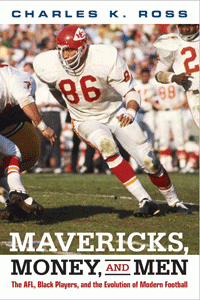 “Although other writers have explored the history of the American Football League, Mavericks, Money, and Men is the most extensive treatment of the league to date. Linking the history of the AFL with a number of key developments in American society and culture, Ross skillfully synthesizes an array of personal memoirs with a wide range of compelling anecdotes. Archival materials also illuminate the internal workings of the AFL. Mavericks, Money, and Men is a valuable narrative history that captures key moments in the development of the nation’s most popular sport.“—Gregory Kaliss, author of Men’s College Athletics and the Politics of Racial Equality
“Although other writers have explored the history of the American Football League, Mavericks, Money, and Men is the most extensive treatment of the league to date. Linking the history of the AFL with a number of key developments in American society and culture, Ross skillfully synthesizes an array of personal memoirs with a wide range of compelling anecdotes. Archival materials also illuminate the internal workings of the AFL. Mavericks, Money, and Men is a valuable narrative history that captures key moments in the development of the nation’s most popular sport.“—Gregory Kaliss, author of Men’s College Athletics and the Politics of Racial Equality
The American Football League, established in 1960, was innovative both in its commitment to finding talented, overlooked players—particularly those who played for historically black colleges and universities—and in the decision by team owners to share television revenues.
In Mavericks, Money and Men, football historian Charles Ross chronicles the AFL’s key events, including Buck Buchanan becoming the first overall draft pick in 1963, and the 1965 boycott led by black players who refused to play in the AFL-All Star game after experiencing blatant racism. He also recounts how the success of the AFL forced a merger with the NFL in 1969, which arguably facilitated the evolution of modern professional football.
Ross shows how the league, originally created as a challenge to the dominance of the NFL, pressured for and ultimately accelerated the racial integration of pro football and also allowed the sport to adapt to how African Americans were themselves changing the game.
Stanford Professor to Discuss the Civil Rights Movement in Mississippi
James T. Campbell will present “Freedom Now: History, Memory, and the Mississippi Freedom Movement” on Monday, April 11th at 3:30PM in the Overby Center Auditorium. This event should be of interest to anyone who wants to learn more about the African American freedom struggle, the civil rights movement, public history, and how history is remembered and commemorated.
James T. Campbell is the Edgar E. Robinson Professor in United States History at Stanford University, where he specializes in African American history and the history of the black Atlantic. His research spans the history of the American slave trade with Africa, the Harlem Renaissance, and the civil rights movement. In his current research, Campbell focuses on historical narratives and storytelling, examining the ways in which societies document and explain their pasts, not only in textbooks and academic monographs but also in historic sites, museums, memorials, movies, and political movements.
Campbell earned his B.A. at Yale University and his M.A. and Ph.D. from Stanford University. Before joining the faculty at Stanford in 2008, Campbell worked at Brown University, where he served as the chair for the Brown University Steering Committee on Slavery and Justice, an organization created by Brown President Ruth Simmons to explore the University’s historical relationship to slavery and the transatlantic slave trade. The Brown University Steering Committee on Slavery and Justice has subsequently become a model for similar investigations on campuses throughout the United States.
Campbell’s first book, Songs of Zion: The African Methodist Episcopal Church in the United States and South Africa (New York: Oxford University Press, 1995), received the Carl Sandburg Literary Award for Non-Fiction and the Organization of American Historians’ Frederick Jackson Turner prize. His second book, Middle Passages: African American Journeys to Africa, 1787-2005 (New York: Penguin Press, 2006), received the Mark Lyton History Prize from the Columbia School of Journalism and Nieman Foundation at Harvard University and the Lois P. Rudnik Prize from the New England American Studies Association. Middle Passages was also a finalist for the Pulitzer Prize in history.
Department to Benefit From $150,000 Planned Gift
A $150,000 planned gift directed to the University of Mississippi Arch Dalrymple III Department of History is expected to help increase the department’s focus on research.
Brig. Gen. John H. Napier III, a 1949 UM history graduate, recently signed a memorandum of agreement, designating the Arch Dalrymple III Department of History as beneficiary of his testamentary gift.
“The gift will help the faculty to advance the department’s mission,” said Joseph P. Ward, professor and chair of the department. “It’s exactly the kind of discretionary money that’s the hardest to come by. For a department like ours, these are the kinds of gifts that can really help us pursue excellence.
“For example, historians still have to travel to archives,” Ward explained. “More of our material is becoming available through the internet, but overwhelmingly we continue to go to archives to do original research. This type of gift is absolutely crucial for that.”
A historian himself, Napier’s book Lower Pearl River’s Piney Woods: Its Land and People was published by the university’s Center for the Study of Southern Culture in 1985. He also penned the Air Force Officers Guide and a history of his family.
In 1989, a previous gift from Napier to the university established a scholarship to help support students from Pearl River County, Miss., and surrounding counties.
Napier retired with the U.S. Air Force in 1977 as a lieutenant colonel and worked in intelligence and special operations. He served in national security at the Pentagon and completed his career at Maxwell Air Force Base in Alabama. After retirement from active duty, he joined the Alabama State Defense Force in 1991 and retired as a state brigadier general in 1997.
As a UM student, Napier was a Taylor Medalist and was active in Sigma Chi fraternity, Air Force ROTC, and on the student newspaper and yearbook staffs. He and his wife, Cameron, live in Ramer, Ala.
Napier’s planned gift gives him membership in the 1848 Society, named for the year the university opened the Lyceum doors to its first students. The society recognizes generous donors who thoughtfully provide for the university through planned and deferred gifts.
For more information, interested individuals can call the UM Foundation at 800-340-9542 or 662-915-5944, or visit www.umfoundation.com/planning.
By Bill Dabney | February 15, 2016
Recent Ph.D. Recipient Telisha Dionne Bailey Receives Riley Prize
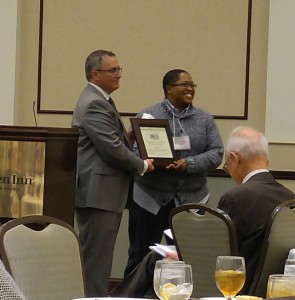 Telisha Dionne Bailey, who earned her Ph.D. from the Arch Dalrymple, III Department of History in 2015, received the Riley Prize at the annual meeting of the Mississippi Historical Society.
Telisha Dionne Bailey, who earned her Ph.D. from the Arch Dalrymple, III Department of History in 2015, received the Riley Prize at the annual meeting of the Mississippi Historical Society.
The Riley Prize was awarded for a doctoral dissertation on a topic in Mississippi history or biography completed during 2014 or 2015. Dissertations were judged on originality of concept, design, and methodology, compilation and effective use of evidence, clarity and precision of style, and significance of the dissertation’s contribution toward an understanding of Mississippi history.
Bailey’s dissertation, which is titled “‘Please Don’t Forget About Me’: African American Women, Mississippi, and the History of Crime and Punishment in Parchman Prison, 1890-1980,” examines the rise of the carceral state through the experiences of the black women who served out their sentences in one of America’s harshest prisons.
Professor Frances Courtney Knuepper’s New Book
The Empire at the End of Time: Identity and Reform in Late Medieval German Prophecy
Oxford University Press, 2016
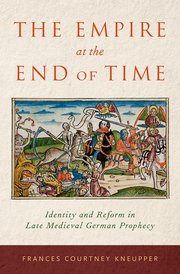 In her new book, Frances Courtney Kneupper, assistant professor of history, examines the apocalyptic prophecies of the late medieval Empire, which even within the sensational genre of eschatological prophecy stand out for their bitter and violent nature. In addition to depicting the savage chastisement of the clergy and the forcible restructuring of the Church, these prophecies also infuse the apocalyptic narrative with explicitly German elements-in fact, German speakers are frequently cast as the agents of these stirring events in which the clergy suffer tribulations and the Church hierarchy is torn down.
In her new book, Frances Courtney Kneupper, assistant professor of history, examines the apocalyptic prophecies of the late medieval Empire, which even within the sensational genre of eschatological prophecy stand out for their bitter and violent nature. In addition to depicting the savage chastisement of the clergy and the forcible restructuring of the Church, these prophecies also infuse the apocalyptic narrative with explicitly German elements-in fact, German speakers are frequently cast as the agents of these stirring events in which the clergy suffer tribulations and the Church hierarchy is torn down.
These prophecies were widely circulated throughout late medieval German-speaking Europe. Kneupper explores their significance for members of the Empire from 1380 to 1480, arguing that increased literacy, the development of strong urban centers, the drive for reform, and a connection to the imperial crown were behind their popularity. Offering detailed accounts of the most significant prophecies, Kneupper shows how they fit into currents of thought and sentiment in the late medieval Empire. In particular, she considers the relationships of German prophecy to contemporary discourses on Church reform and political identity. She finds that eschatological thought was considered neither marginal nor heretical, but was embraced by a significant, orthodox population of German laypeople and clerics, demonstrating the importance of popular eschatological thought to the development of a self-conscious, reform-minded, German-identified Empire on the Eve of the Reformation.
Professor Darren Grem’s New Book
The Blessings of Business: How Corporations Shaped Conservative Christianity
Oxford University Press, 2016
The Book of Matthew cautions readers that “Ye cannot serve God and mammon.” But for at least a century conservative American Protestants have been trying to prove that adage wrong. In The Blessings of Business, Darren E. Grem, assistant professor of history and southern studies, argues that while preachers, activists, and politicians have all helped spread the gospel, American evangelicalism owes its enduring strength in a large part to private enterprise.
Grem argues for a new history of American evangelicalism, demonstrating how its adherents strategically used corporate America–its leaders, businesses, money, ideas, and values–to advance their religious, cultural, and political movement. Beginning before the First World War, conservative evangelicals were able to use businessmen and business methods to retain and expand their public influence in a secularizing, diversifying, and liberalizing age. In the process they became beholden to pro-business stances on matters of theology, race, gender, taxation, trade, and the state, transforming evangelicalism itself into as much of an economic movement as a religious one.
The Blessings of Business tells the story of unlikely partnerships between well-known champions of the evangelical movement such as Billy Graham and largely forgotten businessmen like Herbert Taylor, J. Howard Pew, and R.G. LeTourneau. Grem also shows how evangelicals set up their own pro-business organizations and linked the quarterly and yearly growth of “Christian” businesses to their social, religious, and political aspirations. Fascinating and provocative, The Blessings of Business uncovers the strong ties that conservative Christians have forged between the Almighty and the almighty dollar.
Professor Douglass Sullivan-González’s New Book
The Black Christ of Esquipulas: Religion and Identity in Guatemala
University of Nebraska Press, 2016
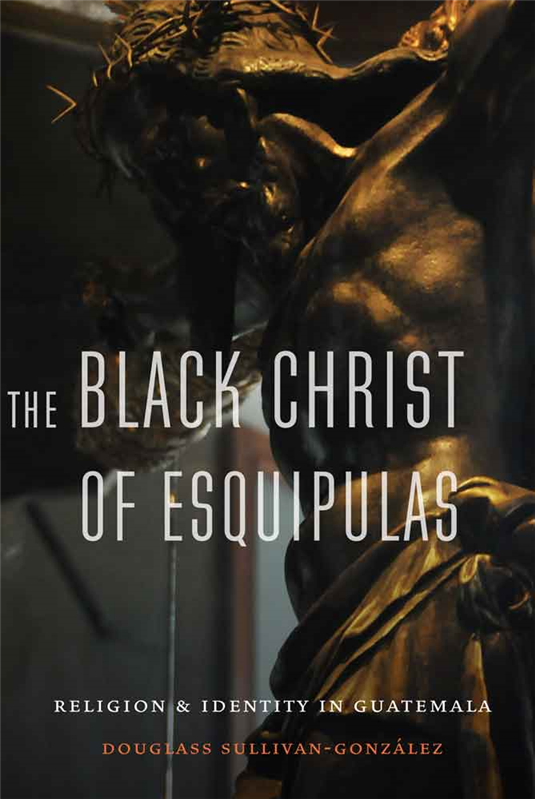 On the eastern border of Guatemala and Honduras, pilgrims and travelers flock to the Black Christ of Esquipulas, a large statue carved from wood depicting Christ on the cross. The Catholic shrine, built in the late sixteenth century, has become the focal point of admiration and adoration from New Mexico to Panama. Beyond being a site of popular devotion, however, the Black Christ of Esquipulas was also the scene of important debates about citizenship and identity in the Guatemalan nation throughout the nineteenth and twentieth centuries.
On the eastern border of Guatemala and Honduras, pilgrims and travelers flock to the Black Christ of Esquipulas, a large statue carved from wood depicting Christ on the cross. The Catholic shrine, built in the late sixteenth century, has become the focal point of admiration and adoration from New Mexico to Panama. Beyond being a site of popular devotion, however, the Black Christ of Esquipulas was also the scene of important debates about citizenship and identity in the Guatemalan nation throughout the nineteenth and twentieth centuries.
In The Black Christ of Esquipulas, Douglass Sullivan-González, professor of history and dean of the Sally McDonnell Barksdale Honors College, explores the multifaceted appeal of this famous shrine, its mysterious changes in color over the centuries, and its deeper significance in the spiritual and political lives of Guatemalans. Reconstructed from letters buried within the restricted Catholic Church archive in Guatemala City, the debates surrounding the shrine reflect the shifting categories of race and ethnicity throughout the course of the country’s political trajectory. This “biography” of the Black Christ of Esquipulas serves as an alternative history of Guatemala and sheds light on some of the most salient themes in Guatemala’s social and political history: state formation, interethnic dynamics, and church-state tensions. Sullivan-González’s study provides a holistic understanding of the relevance of faith and ritual to the social and political history of this influential region.


